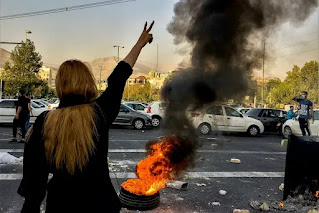Iran Constitutional Revolution
New generations of Iranians demand their country's constitution changed, that is their sovereign right
Iranians protest the death of 22-year-old Mahsa Amini after she was detained by the morality police in Tehran on Oct. 1. MIDDLE EAST IMAGES/AP
These young Iranians, leading by women, have been on streets for more than five months now, demanding a constitutional referendum to be held in their country.
It is important to note that post 1979 Iran's revolution, the country's current constitution was written and presented to the people of Iran for vote. At that time the country has a total population of about 37 million - over 23 million, or 63%, of which were illiterate.
Of that total population, 17.2 million, or 46.5%, was said to had been age 18 or more with voting right. Further 16.1 million, or 43.3%, give and take, were under 14 years of age without voting right. The remaining 3.7 million, or 10%, of the population were between 15-17 years of age also without voting right. They then decreased the voting right to16 to have more illiterate voters added to the cohort of voters in a sham referendum.
The system of government in place in Iran has never been a republic.
Cambridge dictionary defines republic as:
a country without a king or queen, usually governed by elected representatives of the people and a president.
A quick perusal of the country's current constitution reveals a very un-republic, tyrannical structure, nature of the system of government in which one-man--without a single vote from the people--grips the control of the entire country, her people and resources.
Article 4 of the current constitution makes the "fuqaha' of the Guardian Council" the final authority, umpire, of all laws and regulations passed by the country's so-called parliament in Iran.
Article 110
Following are the duties and powers of the Leadership:
1.Delineation of the general policies of the Islamic Republic of Iran after consultation with the Nation's Exigency Council.
2.Supervision over the proper execution of the general policies of the system.
3.Issuing decrees for national referenda.
4.Assuming supreme command of the armed forces.
5.Declaration of war and peace, and the mobilization of the armed forces.
6.Appointment, dismissal, and acceptance of resignation of:
a.the fuqaha on the Guardian Council.
b.the supreme judicial authority of the country.
c.the head of the radio and television net- work of the Islamic Republic of Iran.
d.the chief of the joint staff. e. the chief commander of the Islamic Revolution Guards Corps.
f.the supreme commanders of the armed forces.
7.Resolving differences between the three wings of the armed forces and regulation of their relations.
8.Resolving the problems, which cannot be solved by conventional methods, through the Nation's Exigency Council.
9.Signing the decree formalizing the election of the President of the Republic by the people. The suitability of candidates for the Presidency of the Republic, with respect to the qualifications specified in the Constitution, must be confirmed before elections take place by the Guardian Council, and, in the case of the first term [of the Presidency], by the Leadership;
10.Dismissal of the President of the Republic, with due regard for the interests of the country, after the Supreme Court holds him guilty of the violation of his constitutional duties, or after a vote of the Islamic Consultative Assembly testifying to his incompetence on the basis of Article 89 of the Constitution.
Taking articles 4, 91 and 110 (6)(a) and (b) above together marks a theocratic tyranny taking the entire country hostage. The despot of Iran, the so-called Supreme Leader, appoints personally, directly, six members of the "Guardian Council". He then appoints the other six, indirectly, by his appointee as the Head of the Judiciary (see articles 91, and 110 (6)(a) and (b) above. The so-called Islamic Republic is not even remotely close to a 'republic'.
The country's parliament has no power to make any legislation unless the Guardian Council approves it i.e. without the implicit approval of the despot of Iran. The despot further controls the formation of the parliament by the vetting power of the Guardian Council over all candidates of parliamentary and presidential sham elections--yes, they are, and have been for the past four decades, sham elections.
Moreover, and like if he does not enjoy enough personal power, the Iran's despot, together with support of his IRRGC (the Islamic Republic Revolutionary Guards Corps) cronies, can personally order the country's parliament to pass or drop any bill before it!
The new Iranian generations have legitimate rights to revolt against the despot and his tyrannical regime in Tehran, as we have been witnessing for over past five months. They demand that the legitimacy of the country’s constitution to be tested in a free and independent referendum internationally observed. Their protest, and demand, is nothing short of a constitutional revolution. The despot of Iran, and his cronies, resisted so far by brutally crash the Iranians' protest killing at least 572 and arresting "tens of thousands" more.
2023 is full of surprises for the Tehran's despot and his cronies.


Comments
Post a Comment